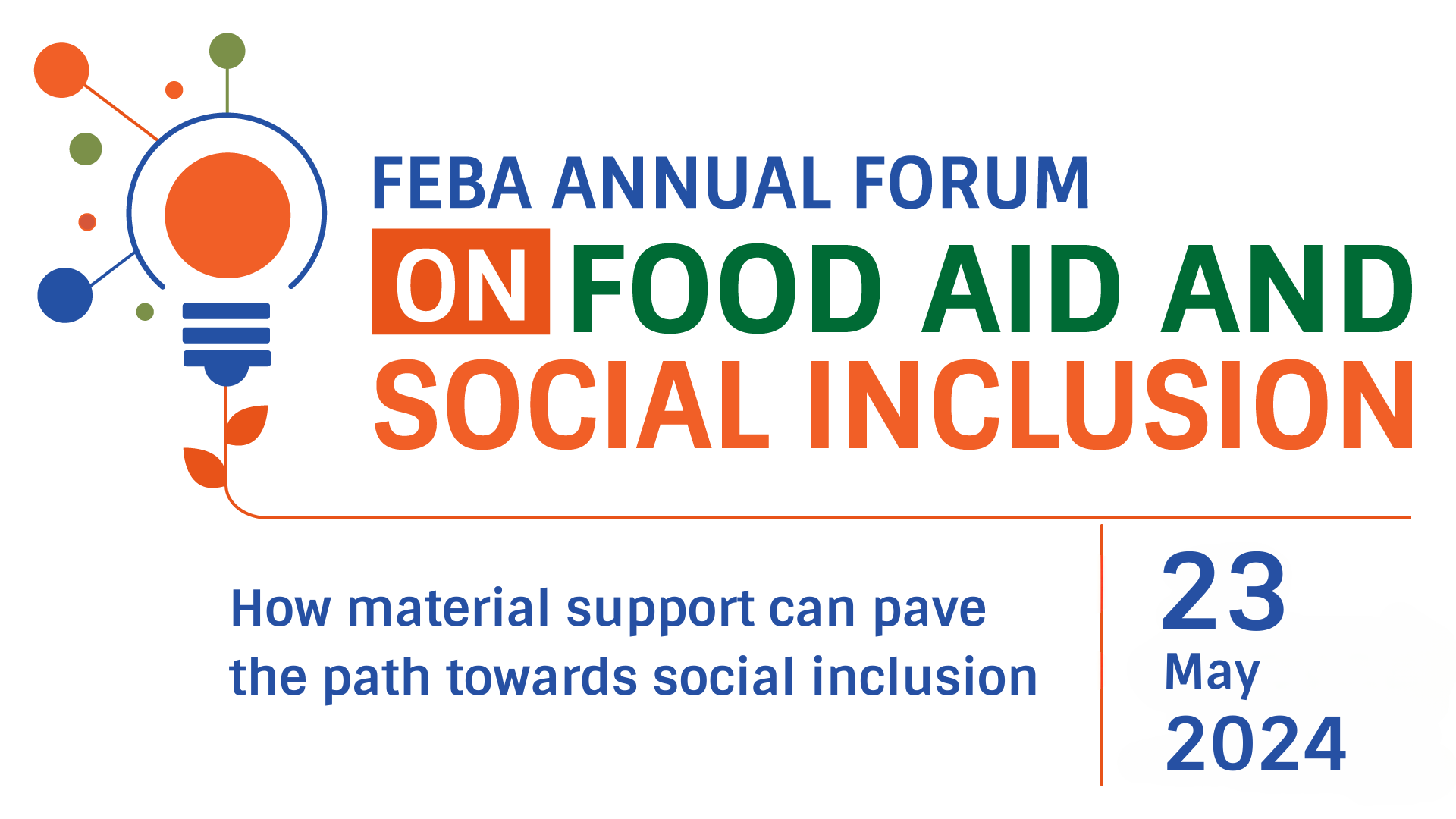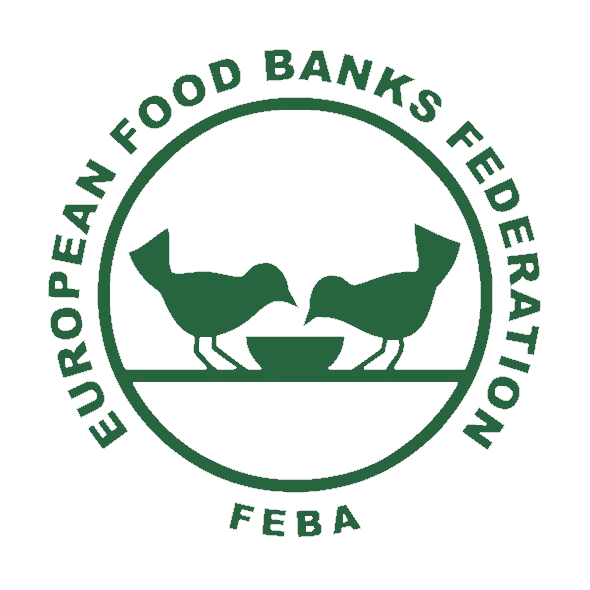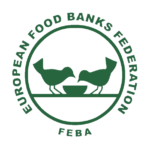
23 may 2024
How material support can pave the path towards social inclusion
The FEBA Annual Forum on Food Aid and Social Inclusion is the annual opportunity to promote dialogue on important topics related to food aid and social inclusion.
Over the years, the FEBA Annual Forum on Food Aid and Social Inclusion has addressed a variety of subjects from different perspectives and angles.
This year, the FEBA Annual Forum on Food Aid and Social Inclusion aims to convene FEBA Members and other stakeholders and experts to take stock of the most important policies at EU level on social inclusion and food aid measures (e.g. Fund for European Aid to the Most Deprived, REACT-EU, CARE, European Social Fund Plus, etc.). More specifically how the distribution of material support can foster social inclusion and which measures were taken by Food Banks and other partner organisations to strengthen social inclusion.
programme
- Opening remarks
Simona Pulbere, DG Employment, Social Affairs and Inclusion, European Commission
- Good practices from FEBA Members
The complementarity of food aid and surplus recovery, Barbara Mauvilain-Guillot, Fédération Française des Banques Alimentaires
Costs of redistribution of surplus food, Kerttu Olõkainen, Toidupank
Collaboration of Food Banks and Vouchers, Simonas Gurevicius, Maisto Bankas
Food Aid through Vouchers, Pedro Castaños, Federación Española de Bancos de Alimentos
- Panel Discussion - Moderated by Lilli Renner
Rimgailė Baltutė, European Social Fund Agency
Luis Vilacha Fernandez, Red Cross EU Office
Annika Sparrer, Eurodiaconia
- Interactive Q&A with the audience
- Closing remarks
Esteban Arriaga, CEO, European Food Banks Federation
Speakers

Esteban Arriaga
CEO European Food Banks Federation (FEBA)
Esteban lives in Brussels after an extensive career working mainly in the field of humanitarian relief with the EU, Doctors without Borders, War Child and others in partnership with international organizations and as an advisor to the European Commission. He has worked in difficult front-line situations in the Middle East, Africa and the Caribbean. He has several degrees from Netherlands and the USA.

Pedro Castaños
Deputy Director at Federación Española de Bancos de Alimentos (FESBAL)
Pedro started to volunteer at the local Banco de Alimentos de Madrid after ending his professional career to help solving the real problems that exist in society. He acts as Deputy Director at Federación Española de Bancos de Alimentos (Spain). He joined the FEBA Board of Directors to contribute with his knowledge and experience with international projects but also to improve the solidarity within the FEBA network.

Simonas Gurevičius
CEO of Maisto Bankas
Simonas is the CEO of Miasto Bankas, FEBA Member in Lithuania. Simonas Gurevičius is an economist with more than ten years of experience in leading non-governmental organizations, as well as similar experience in managing investment and IT businesses. He is an active public figure, former public adviser to the Prime Minister and Member of the Boards of international organizations.

Barbara Mauvilain
Head of Institutional Relations of the French Federation of Food Banks (FFFBA)
Head of the Institutional Relations Department of the French Federation of Food Banks (FFFBA) since December 2021, which manages and coordinates the relations of the 79 Food Banks network with national, local and European public authorities (including the European Federation of Food Banks), relations with partner associations and institutional links with the agricultural world. A graduate of Sciences Po Paris, Barbara Mauvilain was previously responsible for public relations at Coop de France from 2016 to 2021, after working for 12 years at the Economic, Social and Environmental Council as a member of the cooperation group.

Simona Pulbere
Policy Assistant ESF and Cohesion Policy at DG EMPL, European Commission
Working in DG EMPL, Simona Pulbere is coordinating FEAD and ESF+ support in Member States for combatting material deprivation and homelessness and supporting Roma inclusion. She has extensive experience with the FEAD implementation in 2014-2020 programming period, as previously responsible with the FEAD programme in Spain.

Annika Sparrer
Policy and Membership Development Officer
Annika Sparrer is a Social Worker and Political Scientist. The combination of her two professions enables her to connect policy analysis with the knowledge of grassroots challenges and to envision socially inclusive solutions for all. In her role as a Policy and Membership Development Officer working for Eurodiaconia, she focuses on extreme destitution, with a particular interest in essential services, homelessness, as well as child poverty, and advocates for social justice.

Luís Vilachá
Policy and Programme Officer at the Red Cross EU Office
Luís Vilachá is the Red Cross focal point in the EU for food aid & material support and homelessness. He is currently the Chair of the CoP Material Support and follows closely with Red Cross members the use and implementation of ESF+ among Red Cross members. In the past he has worked in Brussels for homelessness and disability organizations. Prior to that Luís worked as social worker in a project funded by FEAD OP2 supporting the rights of EU mobile citizens in Copenhagen.
About the European Food Banks Federation

The European Food Banks Federation (FEBA) is a European non-profit organisation and works in collaboration with 24 Full Members and 6 Associate Members in 30 European countries. Since 1986, FEBA’s mission has consisted in representing its membership at European and international level; supporting and strengthening Food Banks in Europe by providing training, sharing best practices and knowledge, establishing partnerships; and fostering the creation and development of new Food Banks. FEBA brings together a network of Food Banks which are committed to prevent food waste and to reduce food insecurity.
In 2022, the 351 Food Banks belonging to our membership redistributed 876,316 tonnes of food to 44,884 charitable organisations providing food assistance to 12.4 million most deprived people thanks to the professionalism of 97,940 co-workers (93% volunteers). In addition to surplus food from the food supply chain, FEBA Members also redistribute food from the Fund for European Aid to the Most Deprived (FEAD) and the EU Fruits and Vegetables withdrawal scheme, as well as from individual and corporate food collections.


